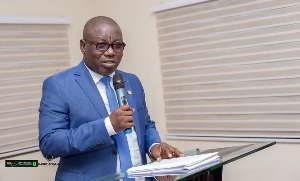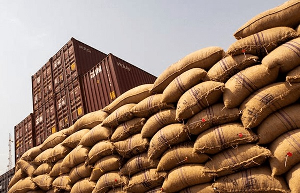...to Build Storage Facilities
Ghana will receive 300,000 pounds sterling from the Commonwealth Local Government Good Practice Scheme (CLGGPS) to build food storage facilities in all 110 districts in the next five years.
The country will also benefit from private and public resources from Commonwealth countries to support the District Response Initiative on HIV/AIDS launched by Vice President Aliu Mahama in August this year.
Mr Kwadwo Baah-Wiredu, Minister of Local Government and Rural Development, told the GNA after the just ended conference of the Commonwealth Local Government Forum in Brisbane, Australia that the offer to Ghana was as a result of her allocation of one per cent of the District Assemblies Common Fund to support the fight against HIV/AIDS and malaria.
"I convinced the delegates that sustainable development cannot be achieved if many of our employable human resources die of AIDS and malaria," he said.
"This revelation fired the interest of the Canadian delegation at the forum and they pledged to support Ghana to combat AIDS and malaria in a sustainable manner."
Mr Baah-Wiredu said food security constitutes one big challenge to farmers and the government, adding that a high percentage of food, including yam, plantain, maize and tomato, goes waste after bountiful harvests.
He said the five-year CLGGPS fund would help build infrastructure and human capacities in the districts to ensure that enough food is preserved during bountiful periods.
Mr Baah-Wiredu said the Poverty Reduction Loan Support (PRLS) scheme poses a challenge to the administration of the District Assemblies' Common Fund, adding "currently about 160 billion cedis are in arrears to beneficiaries."
"My ministry has proposed that each of the 16,000 unit committees in the country should be tasked to mobilize and use at least 10 million cedis from the debtors," he said.
"This would make the collection and application of the fund more localized." He said the unit committees would target areas such as the Poverty Alleviation Fund (PAF), Emergency Social Relief Program (ESRP), Social Investment Fund (SIF) and the Village Infrastructure Project (VIP) for the mobilization of the 160 billion cedis.
This proposal is modelled on a system in India called the Panchayati Raj Institutions (PRI) set up by direct elections. Under it representatives mobilize, apply and manage the finances of various villages.
The Indian model does not only allow communities to have a more free hand in deciding who benefits from the fund but also helps in the easy recovery of loans.
Mr Baah-Wiredu said the five municipalities in Ghana have also been earmarked to benefit from direct CLGF programmes.
These programmes include the lower current techniques, the best practice of clean city for safety, good sanitation and clean environment and a sustainable maintenance and repairs culture.
He said efforts are also underway for leading concrete waste management and plastic and paper recycling companies in the Commonwealth to assist the district assemblies to manage waste and to convert waste materials into useable building materials.
The minister said Ghana retained its positions on the CLGF board and on the finance and membership committee, adding that the memberships of Accra, Kumasi, Tema, Tamale and Senya-Awutu-Enyan assemblies have all been accepted on the CCLGF.
General News of Wednesday, 17 October 2001
Source: .












